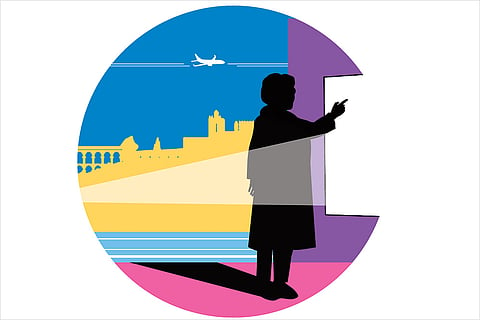Months of Schengen-visa uncertainty ends with my arrival at Barcelona’s El Prat airport, flying in from the US, where I live. I’ve been invited as the opening Plenary Speaker at the 19th International Conference of the Utopian Studies Society of Europe in the port city of Tarragona. The title of the Conference is “In Search of New Harmonies”.
Excited American tourists in their fluorescent tee-shirts swarm alongside me towards immigration. One young man dumps his backpack on the floor beside his section of the zigzag queue to avoid carrying it the extra distance. The bag is instantly snagged by burly security guards: the boy has now to lug the burden for twice the distance. But the sun blazing outside these bland white walls affects even the black-clad immigration officers locked behind their bullet-proof glass booths. They barely glance at passports, before stamping them and waving us through.
My friend Elizabeth Russell is at the airport to welcome me with warm hugs. This is my second visit to Tarragona. Liz, an associate professor, teaches English literature at the prestigious Rovira i Virgili University, one of Spain’s top four. The Utopia conference, due to start the next day, brings together scholars from around the world once a year in different locales, to share thoughts on “an imagined community or society” built on “highly desirable or perfect qualities”(Wikipedia). Having got my passport just one day before flying out of Boston, I’m still working on images for a PowerPoint presentation and my speech.
There’s no time to panic. The check-in at the SB Hotel, centrally located, with a bus terminal next door and a pretty little park right behind, starts only after 3 pm. So we leave my suitcase there while Liz and her partner Joan—pronounced “j’wan”, or “John”, in Catalan—take me out to lunch. I have an excellent side of lamb, Joan has wine-red octopus arms writhing out of his plate and for Liz, grilled veggies as colourful as an artist’s palette. It’s five-thirty by the time I’m in my cool white-and-grey second floor room. Too tired to think, I shower, fall into bed, wake up at 1 am, do my drawings and fall asleep once more.
